- Home
- Adele Griffin
Split Just Right Page 9
Split Just Right Read online
Page 9
“A death threat?” Mom breathes. “I don’t believe it.”
“It’s right here.” He hands the paper over to her with raised-eyebrow assurance.
“Give me a break, there’s no death threat in there.” I grab at the paper, my long arms flailing, trying to drink straight. Why is he doing this to me?
That’s when my eyes pick out a sliver of sentence, “this unbidden longing to slice, slash, and destroy …” My paragraph, my entry for The Lilac contest. The realizing comes at me like a punch; I must have switched the entry with my Rick Finzimer letter, put them in the wrong envelopes by accident before I mailed them out.
And that stupid ending with the knife and the dad coming home must have seemed like I was threatening him … The realization almost chokes me. I’m such a flake. How humiliating. I want to crawl underneath my tortoiseshell and die.
“Mom, it’s not really a threat; it’s one of my contests,” I whisper close to her ear. Mom reads quickly, her eyes darting to me after she hits the last sentence. “A contest,” I hiss. “For a story. I messed up the mailing.”
“By the way, I’m allergic to cats, so I can’t stay here long,” Rick Finzimer says. He pulls out a handkerchief from his pocket.
“Cats?” Mom echoes. I have never seen her in command of so few words.
“Your cats, Raisin and Sprite.”
“The story, it’s—he thinks we have cats.” I want to shake the shocked stare off Mom’s face. I jab my finger at the paper. “Will you explain it to him? Please? I can’t I’m really really sorry. It’s all a great big huge horrible mistake.”
“A contest.” Mom glances at the story again and then up at me.
“Please,” I say. I swallow hard to steady my voice but all my words have dried up. Without another look at Rick Finzimer, I fly out of the room, down the hall to my bedroom, where I slam the door.
I lie on the bed and squeeze my eyes shut, willing myself not to be in this apartment, in this situation. Mom’s understanding of what happened must finally kick in, because through my closed door I can tell she has on her reasonable voice. I listen to the muffled but steady hush of her explanation and then this other voice, this unfamiliar male voice that isn’t Louis’s or Gary’s or Elliot’s, but actually is the voice of my own flesh-and-blood dad. This isn’t how my imagination had ever thought up the day I’d meet my father. This day is too stupid and awkward and full of speechlessness. I press my pillow over my head, turning my world soft and dark.
About half an hour later I hear the front door open and then quietly shut. I listen to Mom padding down the hall and then her fingers tapping on my door.
“Come in.”
“Danny, are you crying?” Mom sits on the edge of the bed and pulls off the pillow. She peers into my face for clues.
“No.”
“He’s gone now.”
“Good.”
“But he wants to take you out to breakfast tomorrow, and he invited us both for lunch tomorrow afternoon at his parents’ house. He felt sorry about the whole … misunderstanding, with the letter. And he’s going to talk to his parents now, tell them about you, and us, and then tomorrow, if it’s okay, we can go meet them. I’ll let you skip school, since it’s a special occasion. Only if you want to.” Mom’s voice is soothing, like when I’m sick with the flu. “So, maybe it was a good thing, your writing this letter. It’s sort of funny, too, when you think about it. Maybe something like this should have happened long ago.”
I raise myself up so I’m slouching against the headboard.
“What do you mean, tell his parents about us?” I ask. “They don’t know about their own granddaughter?”
“Okay, Danny, here’s the thing.”
“They never knew about me? But what you said, you said it was a really ugly falling out and that they had a spiteful grudge against us, you said …” I try to sort and file through Mom’s story.
“I said some things and I didn’t say some other things. But if you want me to tell you the other things now, I will. I’m ready.”
“Just tell it in a simple way, okay? The way it really happened, without all those—” I ripple my fingers in the air. Without all those made-up stories stuck in the cracks to hold the truth together. “Simple,” I repeat. I close my eyes and try to calm my racing mind, waiting for the truth I hope she’ll put there.
“Simple, all right. Your dad.” Mom inhales and lets her breath out slowly, like she’s doing one of her voice warm-up exercises. “I told you how I met him in Philadelphia in the spring of my senior year of high school. You know I worked in the cafeteria of the art museum on weekends for extra money, and your dad came in one day. It was just one of those things, Danny, when your eyes lock—”
“Skip those parts, please,” I mumble. “I know those parts, about how he was so smart and great and how he took you to your first Broadway play and everything. Just tell me the facts.”
“We were never married,” Mom says.
There’s a fact. I can’t even move for a second from the thud of this fact dropping inside my stomach.
“Why not?”
You aren’t even really Rick Finzimer’s daughter, I’m saying to myself, except technically So it doesn’t matter, it doesn’t matter. Who cares if they were married or not? But a sour taste fills my mouth (uncertain whether to laugh or scream …), and a terrible steam of anger rises off my skin. Anger against Mom. “Why not?” I say louder.
“He didn’t want to. No, that’s not fair. Of course he didn’t want to, he was eighteen, I was eighteen. Who gets married that young? He was leaving for college in Vermont that fall.”
“You met him in the spring and he left for college in the fall?” How pathetic; I’m the result of something that was nothing. The soap-opera marriage Mom described probably came right off a real soap opera she was watching while she sat around being eighteen and pregnant and ditched by her summer-fling boyfriend.
“In the spring I wasn’t thinking about the fall. See, Danny, where I came from, from Slater High School, from West Philly, you couldn’t find someone as glamorous as Richard Finzimer anywhere. The way he talked, and he drove this little red car, and his clothes … he reminded me of a movie star. Rick was so different from anything I’d ever seen in real life.”
“Just because of a nice car and nice clothes?”
“You’re right, of course you’re right. But you didn’t grow up the way I did, hopping between families, living on the fringes. I didn’t fit in anywhere. At the time, there was something about him, that look of really belonging somewhere.”
“You had the Massaras.” I shrug. “You belonged to them, sort of.”
“The Massaras were very supportive,” Mom agrees. “They even said they’d take care of you, raise you, if I couldn’t.”
“Oh that would have been a good life for me. With all their crazy rules and sixty hours of prayers before dinner and their post-expiration-date food.”
“They’re good people, Danny.” Mom catches my wrist and I shake off her grip.
“Well, they’re probably not liars,” I say. “At least I could have grown up in a house where people told me the truth every once in a while.”
“I’m sorry, Danny” Mom stands up. “I did the best I could. And I’m sorry he wasn’t any kind of dad to you, but the truth is he never wanted to be a father, and I never wanted you to feel … neglected, I guess. So I invented a few things.”
“Like my bead necklace and my cassette player and my tortoiseshell? He never sent those things, did he? Was it you who gave those to me?”
“It was easier,” Mom says. She stands up and starts walking toward the door. “And I did stop pretending, once you got older. I think that in some ways, too, I was pretending for both of us.”
“You can’t go yet,” I tell her. “I have a million questions. You have to answer them all.”
“My shift starts in fifteen minutes,” Mom says softly. “Your million questions will have to wait a littl
e while.”
Later that night she answers more of my questions, with none of the answers I want. She’s honest. She tells me about how Rick Finzimer tried to give her money for an abortion, how he begged her never ever to tell his parents about me, because he’d be in so much trouble. How he visited her only once just after I was born and even then pleaded with Mom to put me up for adoption. It’s shocking to realize how much a person who didn’t even know me didn’t want me. But the truth feels like a long hot shower, a washing off of all those muddy, half-buried contradictions of Mom’s stories and not-tells.
“Why did you have me then?” I finally ask.
“I wanted a family,” she answers. “Something all my own.”
Selfish, I think. Typical. Wanting something for herself, but she never stopped to think I might need something of my own, too. Like my own father.
Later that night, I throw that stupid broken cassette player right into the kitchen trash can, so that Mom is sure to see it the next morning.
CHAPTER 9
THERE’S A PORCH AND rocking chairs, just as I’d imagined. It’s a wraparound, with potted spider plants hanging from the latticework, and the two painted rocking chairs have little tie-back cushions. What I never could have guessed, though, was that there’d be cats. Dozens of glazed ceramic cats peek and prowl and lurk in every available corner.
“You like them?” asks Mrs. Finzimer. “I always wanted real ones, but Ricky being allergic and all, these were the next best thing. I mold and paint them myself. Keeps me busy.” She’s not at all what I expected; she’s round and stubby as a pigeon with a pigeon’s startled, unblinking eyes, and her gray hair is feathered close to her scalp like a boy’s.
“Wow,” I answer respectfully.
As soon as I walk in the front door the whiff of lemon air freshener that seems to sharpen the focus of the room makes me queasy. I want to turn around and run straight back to the car and hide. But I don’t. I adjust Mom’s scarf over my collar and chest, and allow a polite smile to hold up my mouth. What a day this is turning out to be.
Rick Finzimer arrived at 4M early this morning, true to his word, and took me out to breakfast. Mom acted more concerned about the breakfast than I did, getting up at six in the morning to iron my blue linen dress and polish my shoes before heading out to work the brunch shift at the Greenhouse.
“And wear your headband, to keep your bangs out of your face,” she mentioned twice before she left. She even balanced the headband on top of my toothbrush so I’d be sure to see it.
The breakfast was tough. Luckily, though, Rick Finzimer did most of the talking. He told me how people who live in Europe are obsessed with American sportswear and that he had a good business going, selling baseball caps to department stores in Brussels and Madrid. I found out about his two boys, six-year-old Morgan and three-and-a-half-year-old Madison. I found out about his wife, Caren with a C, whom he met at graduate school in California. She’s a strict vegetarian and can make tofu taste like chicken or beef or swordfish—Elliot probably would have loved to trade recipes with her. I found out that Rick Finzimer’s doctor advised him always to live on the West Coast, because the thinner air helps his bad sinuses.
I found out all these things before ordering my eggs and juice. I also found out that I can sum up all the major points of my own life in under an hour, and still leave myself plenty of room to stretch out inside uncomfortable silences. We weren’t able to have a good laugh over the letter mix-up, even after I apologized. He kept looking at me with the eyes of someone who’s still on his guard, trying to figure out if I might be a psychopath. It was an uncomfortable feeling for us both.
“So you’re interested in writing violent books?” he asked at one point.
“Not exactly,” I answered. “I was just in a bad mood the day I wrote about the girl cutting off her hair.”
“Do you consider yourself to have a bad temper?” he asked.
“Not really,” I answered. The conversation never got much better than that, although we had a couple of good minutes talking about the 76ers’ odds of making the NBA playoffs.
After breakfast I was full of stress and eggs Benedict, and my stomach wasn’t having the greatest reaction to either. Rick Finzimer dropped me off at the apartment in his parents’ sedan and said, “See ya in a few.” I waved to him as he drove away and then crawled back into bed to sleep.
And now, here I am, breakfast barely digested, about to sit down to another strange meal that I don’t really want to eat.
“Isn’t this nice?” Mom asks nobody in particular as we stand in the hall. No trace of her suggests that a couple of hours before, she was carrying food trays and coffee pitchers, zooming all around the Greenhouse. Her hands are scrubbed pink and she’s even wearing her best perfume, Zanzibar, which Louis’s wife gave her six Christmases ago.
The Finzimers’ furniture is all the color of hot-dog toppings. A mustardy rug stretches through the whole downstairs and a ketchup-and-relish pattern swirls through all the matching upholstered furniture. The house seems to be made mostly of dark corners, even in the family room, which is where Mrs. Finzimer leads us since “the light’s better in here.”
We sit: my mother, my father, my grandmother, and I.
“Big Rick’s out in the woodshed,” Mrs. Finzimer says as she plumps herself deep into a recliner. “He’ll be along soon.” There’s a bag of knitting on the floor beside her; she reaches for a folded square of yellow before she thinks better of it and returns her hands to a little round ball in her lap. “I sure am sorry I couldn’t have stolen some more time to prepare a nicer lunch; this was quite a shock for me, last night. I must say I had to think quite a while before I could even put a picture of you back into my head, Susan.”
She smiles as she says this and I notice one of her front teeth is crooked. My grandmother has a crooked front tooth. I’ve been checking off these facts to myself the minute we pulled onto pleasant, tree-lined Poplar Avenue. My grandparents’ house is beige-colored stucco. My grandfather has a woodshed.
“Well, I only visited here a few times,” Mom says, patting wisps of her hair behind her ears and leaning forward in a gesture that to me seems a little bit over-friendly “So it’s only natural you wouldn’t remember me.”
“Oh, but I do.” My grandmother nods. “It was in the summer. You were wearing a real tight miniskirt. I recall it, because it had a goldfish pattern, and because it was so tight. And your shoes with those real high—”
“Strange how I don’t remember that outfit.” Mom cuts her off with a smile. She gently bounces a shiny foil-wrapped present on her lap like a baby “Teenagers sure can be goofy, though, huh?” This statement is met with silence from the room. “We brought you something,” Mom continues chattily addressing Mrs. Finzimer. I keep wishing she’d call her a name like Paula or Mrs. Finzimer, so I’d know what to call her, but I guess Mom doesn’t know, either. “Just a silly little thing from Danny’s and my favorite tea shop in town, isn’t that right, Danny?” She half stands and passes the box to Mrs. Finzimer.
“Uh-huh,” I say, almost under my breath. These pointless conversations have been squeezing themselves out painfully from the moment we arrived. I try harder, for Mom’s sake. “More like a coffee shop.”
“Oh, how nice.” The crooked tooth appears again. “What do we have here?” She unwraps the ribbons and shiny paper, and her hands poke through the layers of tissue before pulling out six earthenware coffee mugs. “How nice,” she repeats with the exact same inflection. “Really, you shouldn’t have. They’re very nice.” She holds up a mug for Rick Finzimer to see and then she slides the box down next to her knitting.
“Just a nothing thing, really” Mom clears her throat. She crosses her legs and then crosses them the other way, smoothing a hand over the back of her skirt. It’s surprising to me that Mom decided to dress pretty normally for the visit. I was expecting her army lug-sole boots or her good-luck-dragon beaded shawl—even her blond china-do
ll wig, if she was really feeling the need for disguise. But in her striped red shirt and silver necklace and with her hair combed flat into a braid behind her ears, she looks like she could have been anyone’s mom.
“Do you drink a lot of coffee?” Mrs. Finzimer asks, glancing down at the mugs.
“Too much, I’m afraid.” Mom laughs apologetically
“It’s very bad for you.” Mrs. Finzimer holds up her hand and turns her face like she’s refusing a cup right at that moment. “Caffeine.”
“I never let Danny drink it,” Mom says, pointedly avoiding my deadeye.
“It can stunt your growth,” Mrs. Finzimer says, her pigeon eyes direct on me. I can’t figure out if that’s her way of telling me that I’m too tall and maybe should have enjoyed a little more caffeine when I had the chance.
“Danny’s a basketball player,” Rick Finzimer mentions. He stares out the window as he says it, his eyes captivated by the empty street outside. “She’s captain of the freshman team,” he adds.
“She’s the best player in the whole school,” Mom says. I glare at her, but the years have taught me that Mom has no bragging censor.
As soon as she got back from her Greenhouse shift this morning, Mom had made me give her every detail of my breakfast. My answers were like fertilizer; everything I said seemed to generate two or three new questions. Then Mom rehashed through stories about Rick Finzimer: their spring formal, the Broadway play, the picnic out in Valley Forge. This batch of stories must have been true, considering they were so boring and I’d heard them all before.
“Do you still like him or something?” I asked finally Mom’s face had colored and she’d ahemmed a couple of times.
“No, no, no, it’s only …” But then the phone rang and it was Rick Finzimer with directions to his parents’ house and she had talked to him forever in a quiet sweet-as-honey voice. She probably managed to get in some more brags about me during that call, too.
“Ricky played basketball.” Mrs. Finzimer nods. She stares at her son, who also nods.

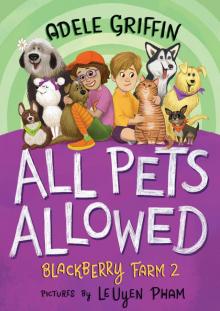 All Pets Allowed
All Pets Allowed Witch Twins Series
Witch Twins Series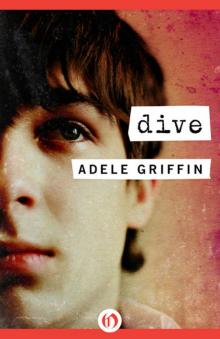 Dive
Dive V is for...Vampire
V is for...Vampire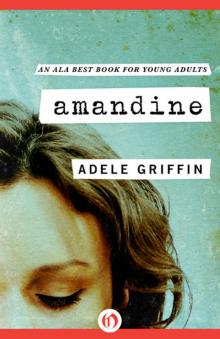 Amandine
Amandine The Knaveheart's Curse
The Knaveheart's Curse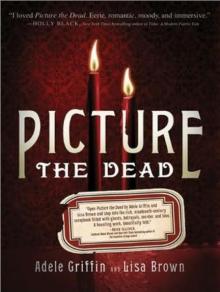 Picture the Dead
Picture the Dead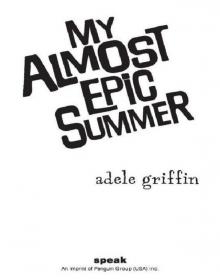 My Almost Epic Summer
My Almost Epic Summer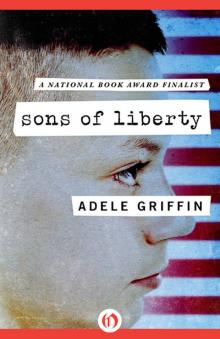 Sons of Liberty
Sons of Liberty Overnight
Overnight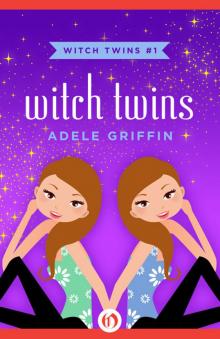 Witch Twins
Witch Twins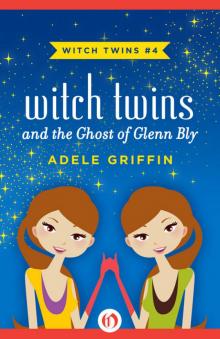 Witch Twins and the Ghost of Glenn Bly
Witch Twins and the Ghost of Glenn Bly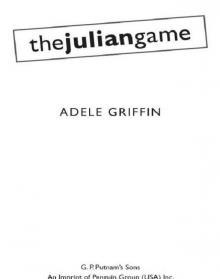 The Julian Game
The Julian Game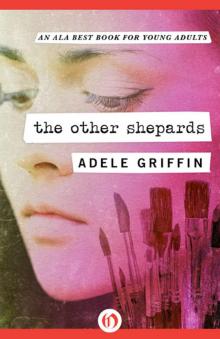 Other Shepards
Other Shepards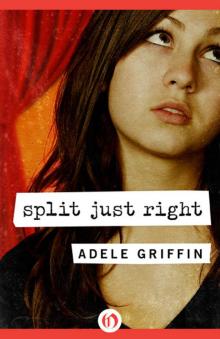 Split Just Right
Split Just Right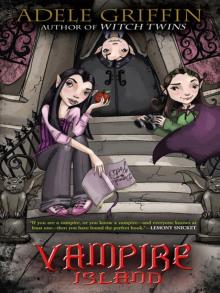 Vampire Island
Vampire Island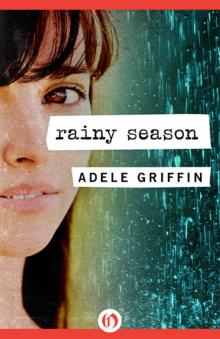 Rainy Season
Rainy Season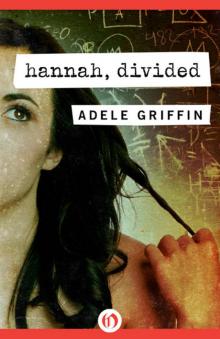 Hannah, Divided
Hannah, Divided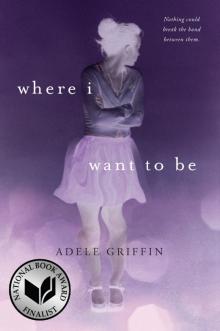 Where I Want to Be
Where I Want to Be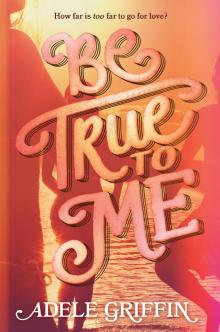 Be True to Me
Be True to Me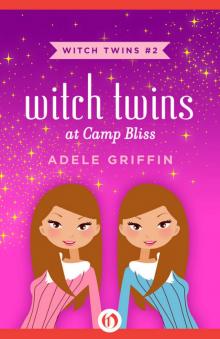 Witch Twins at Camp Bliss
Witch Twins at Camp Bliss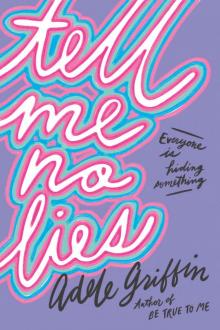 Tell Me No Lies
Tell Me No Lies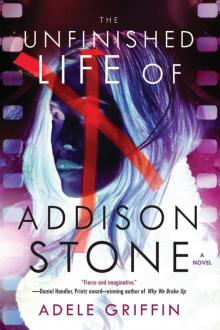 The Unfinished Life of Addison Stone
The Unfinished Life of Addison Stone